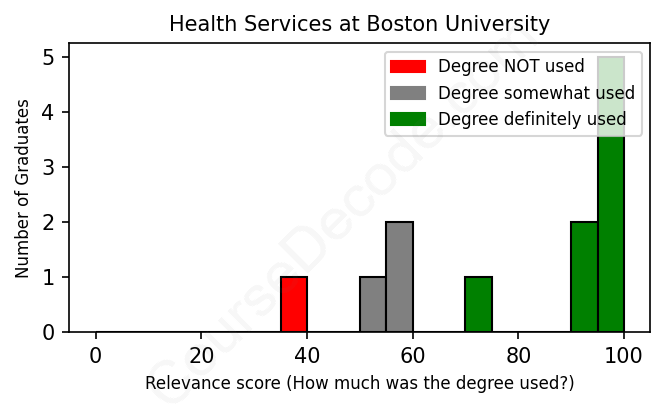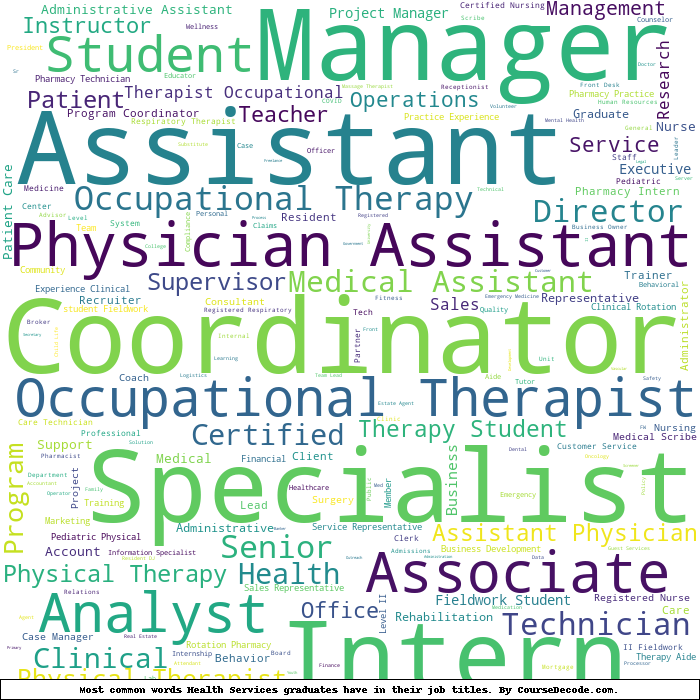
First, some facts. Of the Health Services graduates from Boston University we've analyzed , here's how many have used (or NOT used) their degree in their career:

These are estimates based on AI analysis of 12 LinkedIn profiles (see below).
The verdict? Significantly above average. Overall, with an average relevance score of 79%, Health Services graduates from Boston University have a much higher likelihood (+12%) of finding work in this field compared to the average graduate across all fields:
And for comparison, here's the chart for all profiles we've looked at across all degrees.
Also, after graduating, 83% of these graduates have pursued further education other than another Bachelor's degree (such as a Masters degree or other), compared to the average across all profiles of 35%. This suggests you may need more than just a Bachelors degree to be competitive as a Health Services graduate.
See the details:
|
Relevance score: 59% We think this person has gone into a career only somewhat relevant to their degree. We think this person has gone into a career only somewhat relevant to their degree.
DEGREE INFOGraduated in 2015 from Boston University with a Bachelors Degree in Health Services. Also pursued further education since (see below). JOB HISTORY SINCE GRADUATIONIntern Boston Public Health Commission Mar 2015 - May 2015 Associate  Boston Public Health Commission Jun 2015 - Aug 2015 Assistant Coordinator  Boston Public Health Commission Sep 2015 - Aug 2016 Practice Coordinator  UCSF Medical Center Nov 2016 - Apr 2019 Clinical Research Coordinator  UCSF Medical Center Apr 2019 - Jun 2022 FURTHER DEGREES DONE SINCE GRADUATINGAccelerated Bachelor of NursingUniversity of Massachusetts Amherst 2022 - 2024 ABOUTNo information provided. |
The top 10 most common jobs done by the graduates we've analyzed (ranked most common to least) are:
From the list of jobs held by Boston University graduates with a degree in Health Services, there seems to be a solid mix of roles that are directly applicable to health services and others that find a more indirect relationship. Many graduates have taken positions in well-established healthcare facilities, such as Children's Healthcare of Atlanta and Boston Public Health Commission, where they leverage their training in nursing, project management, and clinical services. It's clear that roles like RN-BSN, Medical Assistant, and Physician Assistant are very relevant, as they directly use the knowledge gained from their academic programs. These positions focus heavily on patient care, public health, and direct healthcare service delivery, showcasing the practical application of their education.
However, a noticeable portion of graduates have also ventured into roles that are less focused on direct health services. For instance, many have taken project management roles or internships in related industries, including digital marketing and public policy, where the connection to their degree isn't as strong. While skills like project management and analytical thinking can certainly be beneficial in broader health services contexts, these positions often lack the daily application of core health-related knowledge. Overall, it appears that while there are plenty of beneficial and relevant opportunities in health services, some graduates have opted for paths that don't fully align with their degree, highlighting a diverse range of career possibilities that may extend beyond traditional health roles.
Here is a visual representation of the most common words in job titles for Health Services graduates (this is across all Health Services graduates we've analyzed, not just those who went to Boston University):

The graduates from Boston University's Health Services program seem to have a pretty solid start when it comes to their careers. Right after graduating, many of them jump into internships or entry-level positions in health-related fields, like research assistants or project coordinators at health organizations. For example, you'll see those who graduated in 2015 landing roles at the Boston Public Health Commission, and those from 2017 gaining experience as medical assistants or in other health service roles. It looks like the first jobs often connect directly to health services, which is a great sign for recent grads looking to build relevant experience right off the bat.
Fast forward about five to ten years, and many of these graduates are moving into higher-level positions or specialized roles. Some have become project managers or coordinators in reputable health organizations, while others have taken on clinical roles like physician assistants. It’s clear that the foundation they built in their early careers—often through internships and grassroots positions—pays off as they climb the ladder. Graduates from the program appear to be carving out successful paths in healthcare, with many ending up in roles that not only pay well but also allow them to make a meaningful impact in public and patient health. Overall, it looks like the Health Services degree from BU is quite a valuable asset for building a fulfilling career in health-related fields.
Honestly, a Bachelor’s degree in Health Services can be a bit of a mixed bag in terms of difficulty, and Boston University is generally pretty rigorous in its academics. You’ll find some subjects that can feel manageable, especially if you enjoy topics like health policy or community health, but there are also tougher classes, especially those that dive into statistics or research methods. Basically, it’s not necessarily a walk in the park but it’s also not the hardest thing you could choose. If you’re organized and keep up with your workload, you should be able to handle it just fine!
Most commonly, in the LinkedIn profiles we've looked at, it takes people 4 years to finish a Bachelor degree in Health Services.
Looking at the job trajectories of these Boston University Health Services graduates, it seems like many of them have landed decent roles that could potentially pay well, especially those in nursing, physical therapy, and project management. For instance, the RN at Children's Healthcare of Atlanta and the Physician Assistants are likely earning good salaries since those are in-demand health professions. The ones who climbed the ranks in project management at Whole Systems and CVS Health also appear to be in positions that can be pretty lucrative. That said, there are a few recent grads still in internships or entry-level jobs, which might not pay as well initially, but they’re building up experience that could lead to better pay down the line. Overall, while some are still getting established, it looks like a lot of them are on the right track to making decent money in the future!
Here is a visual representation of the most common words seen in the "about" section of LinkedIn profiles who have a Bachelor degree in Health Services (this is across all Health Services graduates we've analyzed, not just those who went to Boston University). This may or may not be useful:

Here are all colleges offering a Bachelor degree in Health Services (ordered by the average relevance score of their Health Services graduates, best to worst) where we have analyzed at least 10 of their graduates:
| College | Score | Count |
|---|---|---|
 The Ohio State University The Ohio State University
|
88 | 14 |
 Quinnipiac University Quinnipiac University
|
88 | 10 |
 Grand Valley State University Grand Valley State University
|
87 | 16 |
 University of Tampa University of Tampa
|
87 | 10 |
 Stony Brook University Stony Brook University
|
80 | 15 |
 Boston University Boston University
|
79 | 12 |
 University of Connecticut University of Connecticut
|
78 | 26 |
 Florida Agricultural and Mechanical University Florida Agricultural and Mechanical University
|
76 | 12 |
 Texas A&M University Texas A&M University
|
72 | 16 |
 University of South Florida University of South Florida
|
72 | 26 |
 Boise State University Boise State University
|
71 | 11 |
 University of Central Florida University of Central Florida
|
68 | 47 |
 Florida Gulf Coast University Florida Gulf Coast University
|
68 | 10 |
 James Madison University James Madison University
|
66 | 26 |
 University of Missouri-Columbia University of Missouri-Columbia
|
66 | 17 |
 California State University, Fullerton California State University, Fullerton
|
66 | 13 |
 California State University - East Bay California State University - East Bay
|
66 | 10 |
 Arizona State University Arizona State University
|
62 | 10 |
 Cleveland State University Cleveland State University
|
60 | 10 |
 Stockton University Stockton University
|
58 | 12 |